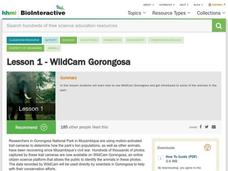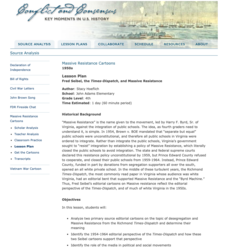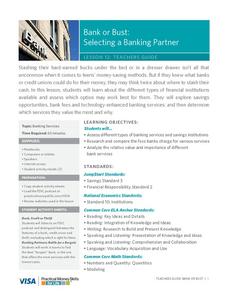Roy Rosenzweig Center for History and New Media
End of the Cold War
How significant was the Cold War during the 20th century? After reading and analyzing speeches by Ronald Reagan and Mikhail Gorbachev, learners consider the historical context of foreign policy decisions made during the Cold War by both...
Learner
Solid Shapes
A collection of two lessons, kindergartners will identify two-dimensional shapes in solid shapes. They will develop basic knowledge of the components that make up a sphere, rectangular prism, pyramid, cylinder, cone, and cube. Young...
Howard Hughes Medical Institute
Lesson 1: WildCam Gorongosa
Take a walk on the wild side! Episode one of an eight-part series of interactive lessons regarding Gorongosa National Park invites learners to become a part of the citizen science community. Scholars read a brief overview of the trail...
Lakeshore Learning
Comparing and Ordering Fractions
Math can be satisfying for the mind and the stomach! Incorporate slices of pizza into your fractions instructional activity with a set of informative resources. After a brief guided instructional activity on comparing and ordering...
Roy Rosenzweig Center for History and New Media
Fred Seibel, the Times-Dispatch, and Massive Resistance
A lesson challenges scholars to analyze editorial cartoons created by Fred Seibel, illustrator for the Times-Dispatch, during the Massive Resistance. A class discussion looking at today's editorial pages and Jim Crow Laws leads the way...
Curated OER
Walk Two Moons: Hook and Concept of a Frame Story
As an introduction to Sharon Creexh's Walk Two Moons, a volunteer dons a pair of boots and walks about the classroom.Observers then ponder the axiom, Don't judge a man until you've walked two moons in his moccasins. Their collaborative...
Judicial Learning Center
The Bill of Rights and Civil Liberties
Why is the Bill of Rights so important to American's civil liberties? An important resource helps scholars find these answers and more by reading through state and federal constitutions to discover their own civil liberties. The activity...
Visa
Bank or Bust: Selecting a Banking Partner
Why shouldn't we just save all our money in our mattress? Couldn't our money disappear? Pupils discover the benefits of utilizing banks and credit unions for saving money, as well as how to evaluate different types of institutions by...
Visa
Savvy Spending: Sharpening Money Decisions
Do you really need that new laptop/phone/dress/jacket/etc.? Financial decisions require us to distinguish between our wants and our needs. Through discussion and the evaluation of scenarios on provided worksheets, this resource will...
Visa
Make It Happen: Saving for a Rainy Day
Every little penny counts, especially when it comes to saving for emergencies or long-term goals. Pupils evaluate different saving and investment strategies, such as a CD or money market account, through worksheets and by researching...
National Endowment for the Humanities
Martin Luther King, Jr. and Nonviolent Resistance
Was nonviolent resistance the best means of securing civil rights for black Americans in the 1960s? In this highly engaging and informative lesson, your young historians will closely analyze several key documents from the civil rights...
iCivics
Propaganda: What’s the Message?
As class members progress through eight fully prepared learning stations, they will identify how bias is present in persuasive media, as well as differentiate among types of propaganda techniques like bandwagon propaganda and the use of...
Nemours KidsHealth
Obesity: Grades 3-5
What is obesity and what are some steps that can help? Investigate obesity by having your class read and discuss articles about obesity. Students gain knowledge about body mass index, the food pyramid, being overweight and dieting. They...
Nemours KidsHealth
Empathy: Grades K-2
Second graders read articles about being afraid, dealing with anger and apologizing. In this feelings lesson plan, 2nd graders read articles and discuss the feelings they have. Students describe their feelings and how to be supportive of...
National Endowment for the Humanities
The Impact of a Poem's Line Breaks: Enjambment and Gwendolyn Brooks' "We Real Cool"
Students analyze the Gwendolyn Brooks use of enjambment in her poem "We Real Cool." In this poetry analysis activity, students define common poetic devices and the examples of enjambment in the poem. Students discuss the poem and write...
National Endowment for the Humanities
Robert Frost's "Mending Wall": A Marriage of Poetic Form and Content
High schoolers examine the relationship between a poem's form and its content in Robert Frost's poem, 'Mending Wall.' They read and analyze the poem, explore websites, listen to an audio clip of Frost reading the poem, and write an...
National Endowment for the Humanities
Faulkner's As I Lay Dying: Crossing the River
Learners analyze the multiple voices in William Faulkner's As I Lay Dying. For this multiple voices lesson plan, students explore the use of symbolism with the narrative voices of the text. Learners write a detailed profile of one...
National Endowment for the Humanities
Edgar Allan Poe, Ambrose Bierce, and the Unreliable Biographers
High schoolers research biographical facts about Edgar Allan Poe and Ambrose Bierce and complete literary analysis activities. In this biographical lesson plan, students research basic biographical facts about Poe and Bierce. High...
Visa
Keeping Score: Why Credit Matters
How does one get credit, and who provides credit? What is a credit score, and how can an understanding of a credit score help you to make smart financial decisions? Through discussion and worksheets, class members will identify the...
Nemours KidsHealth
Food Labels: Grades 3-5
Bring awareness to the ingredients scholars ingest daily with two lessons that look deeply into food labels. The first activity explores the difference between processed and fresh foods while the second activity focuses on sugar content.
Baylor College
Do Plants Need Light?
Turn your classroom into a greenhouse with a lesson on plant growth. First, investigate the different parts of seeds, identifying the seed coat, cotyledon, and embryo. Then plant the seeds and watch them grow! Measure the new plants...
Baylor College
Post-Assessment: Global Atmospheric Change
Find out how much your earth scientists learned about the atmosphere in the unit on global atmospheric change with this assessment. After writing a letter to persuade others to make changes to protect our atmosphere, pupils take the same...
CPALMS
Analyzing Vonnegut's View of the Future and His Commentary on the Present in Harrison Bergeron
Kurt Vonnegut's short story "Harrison Bergeron" engages adolescents with its theme about the dangers of complete societal equality. Learners complete a graphic organizer to track literary elements in the story, as well as an inference...
Historical Thinking Matters
Rosa Parks: 5 Day Lesson
What led to the success of the Montgomery Bus Boycott, and how might historians approach this question differently? This rich series of lessons includes a short introductory video clip, analysis of six primary source documents, and...

























